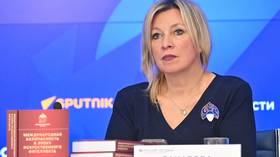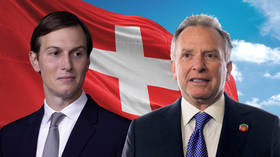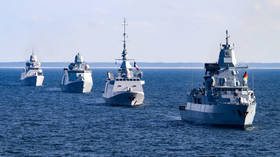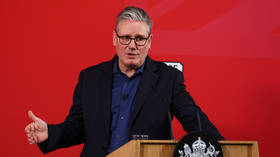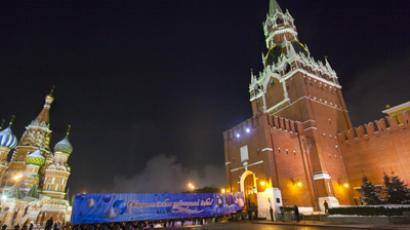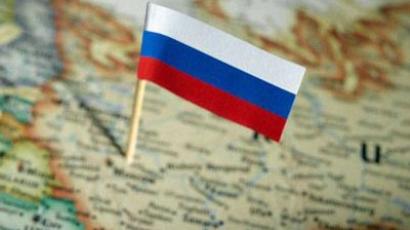Putin: We need a new economy
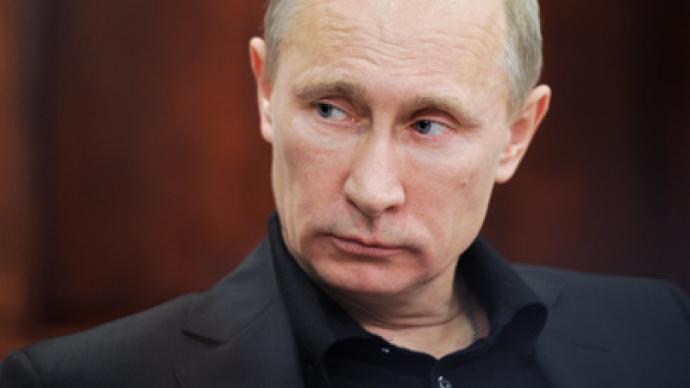
Russia’s Prime Minister Vladimir Putin speaks on the country’s role in the global division of labor, overcoming technological inferiority and the role of the state in modernizing the economy.
We are living in a time of radical economic change across the globe. Never before have there been such rapid technological advances. Much of what we are accustomed to seeing around us today seemed like science fiction 15 to 20 years ago. Never before has the struggle for leadership in global competition been so acute, and we are now seeing countries which, only yesterday, seemed to hold unshakable positions starting to yield to those who until recently were regarded with condescension and disdain. Never before have people faced such a great risk of technological disaster and never before have environmental hazards been so grave. But neither has human capability been so vast. Those who apply the new capabilities to the fullest extent are the ones who come out on top.In such circumstances, it is important to ensure stable and consistent economic development, a maximum level of protection from the shock of recession for our citizens and, at the same time, the steady and rapid advancement of all aspects of the economy, from its material and technical foundation to approaches to state economic policy.
Russia’s place in the global division of labor
Following the collapse of the Soviet bloc, Russia was forced to find its place in the global division of labor, where the main centers of power and proportions were formed without it, and what is more, they had been formed in opposition to the USSR. Developed markets were fenced off by numerous barriers erected to protect national interests. Another problem on the way towards integration into the global economy was the difference in technological standards.In these conditions we were, nevertheless, able to build an economy that has become an integral part of the global economy. We were mainly able to do so due to our natural resources. More than a quarter of Russia’s GDP is a result of the sale of gas, oil, metals, timber and other natural resources or primary commodities on the global market.Today, Russia depends on the world economy, into which it is highly integrated, more than most other countries do.Affirmation of the primary nature of the economy has become commonplace. The Soviet economic complex, autarkic and closed, simply wasn’t adapted to working in the new conditions. In the process of market transformation, which was largely spontaneous, the survivors were mostly the liquid sectors, those involved in the export of unprocessed raw materials and semi-finished products. We had basically experienced a large-scale de-industrialization, a loss of quality and an all-out simplification of the structure of production. Hence the high level of dependency on the import of consumer goods, technologies and sophisticated products, as well as on the fluctuation in prices for the basic export commodities: in other words, factors that, by and large, we do not control.Having an economy that does not guarantee stability, sovereignty, or decent prosperity is unacceptable for Russia. We need a new economy with a competitive industrial sector and infrastructure, with a developed service industry and with an effective agricultural sector – an economy, operating on a modern technological base. We need to build an effective economic renewal mechanism, to find and attract the necessary vast material and human resources.At the same time, we cannot count on protectionist measures at a time of economic diversification – and not because we have become members of the World Trade Organization. We acceded to the organization precisely because we have an economy that is heavily dependent on the foreign market both in terms of production and consumption.However, high import duties are paid by our citizens and our enterprises. Excessive protectionism has always led to stagnation, a low level of quality and high prices.
Overcoming the technological gap
We need to look for solutions that would allow us to overcome the emerging unilateral technological dependence.Of course, today, no one would repeat the experience of the Soviet Union which, in the midst of confrontation with the West, had formed a fully autonomous technological base. As a result, in conditions of isolation, most of the “original” technologies fell behind their competitors, a development which became clear as soon as the Iron Curtain fell. Naturally, we are talking about a different scenario. Russia must assume the most important place in the international division of labor not only as a supplier of raw materials and energy, but also as the possessor of constantly advancing high-end technologies – at least in some sectors. Otherwise, we will continually be losing resources by paying for the latest, more complex and expensive, technologies and industrial products, materials and medicines which we are unable to produce ourselves. Meanwhile, these technologies will continue to have a rising share in global world product, while the share of raw commodities and traditional services will decline. In order to restore technological leadership, we need to carefully choose our priorities. Some of the candidates are industries such as pharmaceuticals, high-tech chemistry, composites and non-metallic materials, aviation, information and communication technology and nanotechnology. Of course, the traditional leaders, where we have not lost our technological edge, are our nuclear and space industries. This list is not closed; more industries may be added, depending on international market trends and, in no small part, on the initiative of industrial employers and workers.It is often argued that Russia does not need an industrial policy and that, when choosing priorities and creating preferences, the government often makes mistakes by supporting ineffective players and getting in the way of the innovation that should stem from equal competition. It’s hard to argue with such assertions, but they are valid only if all other conditions remain the same. We went through de-industrialization and the economic structure is severely deformed. Large private capital does not willingly flow into new sectors – in order to avoid higher risks. We will certainly use tax and customs incentives to encourage investors to allocate funds to innovative industries. But this could show its effects several years from now – or not if more attractive investment options emerge in the world. Capital, after all, does not have borders. Are we ready to put Russia’s future at such great risk for the sake of purity of an economic theory?It was the priorities of our industrial policy that dictated our actions when creating large state-owned corporations and vertically-integrated holding companies – from Rostekhnologii and Rosatom to the United Aircraft Corporation and United Shipbuilding Corporation. The goal was to stop the collapse of the intellectual sectors of our industry and to retain the scientific and industrial potential through the consolidation of resources and the centralization of management. Today, this goal can be considered as having been achieved.We needed to gather the formally state-owned separately operated assets, most of which had lost contact with research and design centers. The result of the implementation of industry-specific holding strategies needs to be the creation of globally competitive, highly-capitalized corporations that have found and are expanding their place in the global market. It is these types of corporations that combine promising research and product development right through to the production, supply and servicing of high-technology products, which are today dominating the global market in aerospace, shipbuilding, computer technologies, pharmaceuticals and medical equipment. They are also issuing orders for small innovation companies and buying successful start-ups.So far, most integrated structures have not become globally competitive, highly-capitalized, or even consistently profitable. We are not planning to stop what we started mid-way. In some areas, such as the aviation industry, it was only now possible to complete the complex process of asset consolidation. Clearly, however, the time has come to test the vitality of every such project. Today, they are in need of top management to be highly competitive in the innovation business.I would like to stress that the government’s efforts have been aimed at restoring Russia’s ability to compete in sectors with only a few players in the global market. This was not about suppressing the private initiative, as there was simply no such initiative in these sectors. It is erroneous to draw conclusions about the rise of state capitalism based on our work in collecting, restructuring and pre-sale preparation of assets.Today, we have a plan for reorganization and entry into the market for every company. Some of them will be turned into public companies with a subsequent sale of shares. This will affect Rostekhnologii, Rosavtodor, the civil part of Rosatom, and a number of other state-owned corporations. This is not a one-day job, but neither can we perpetually procrastinate. I believe it is possible by the year 2016 to reduce the government’s share in certain raw material companies and complete the withdrawal from the capital of major non-commodity companies which are neither considered natural monopolies nor belong to the defense industry. We are counting on the active participation of Russian capital in the privatization and further development of high-technology assets. At the same time, we need to look for buyers among global investors who are not only ready to invest in the scientific and industrial base, but also to offer their connections and their place in major international markets. The successful economic modernization experience of such countries as Korea and China shows that an impetus from the government is needed but that its effect is outweighed by the risk of making a mistake. It will be difficult to achieve diversification without concentrated efforts. But, knowing all the risks of selectivity, we need to make the policy of the selection of priorities and government support more transparent and open for assessment and discussion on the part of competing firms and professional associations.Competition, which lies at the heart of the modern economy, is based on the fact that corporations – the developers and owners of advanced technologies – tend not to allow consumers of these technologies into something that can be referred to as the technological core. These are not only pilot projects, but also the full service cycle. We saw this from our own experience when, during the recession, our Russian companies tried buying a number of assets from abroad. As soon as it came to full-cycle technologies – even in the auto industry – our Western partners immediately gave us the red light.When selling the latest technological developments, the supplier usually seeks to retain some of the complex elements of equipment maintenance and technical processes. The buyer, thus, becomes not only technologically but also economically dependent on the supplier. If a country becomes an outsider in the field of advanced technology solutions, it is bound to sustain a permanent economic loss. Even if manufacturing facilities are located on its territory, the lion’s share of the profit goes to where the head offices, laboratories, and design bureaus are located.Therefore, developed countries work on the principles of technological cooperation. Their inter-dependence bolsters their economic and political stability.
The innovation cycle of the Russian economy
The main economic condition for innovation is competition. Only competition is able to force private enterprises to search for better technological solutions and to thus advance production. I see all of the challenges a number of our industries will face with our accession to the WTO. I would like to assure you that I will do everything possible to ease the difficulties of the transition period. But all manufacturers of industrial goods must clearly understand that the time of national markets has passed. There will be no more cosy niches. In high-tech manufacturing, there is only one market – the global one.There is another side of the coin: the supply side of innovation. The Russian economy is not only capable of buying but it is also capable of engendering innovation. Our place in the world of the future solely depends on whether we use our capabilities.The high level of education among the population, the rich legacy of fundamental science, the presence of engineering schools and the pilot production base which remains in many sectors – we must engage all of these factors.In previous years, we invested heavily in institutions, ensuring the commercialization of applied research. We have Rosnano, the Russian venture company; the government is sponsoring competitions for the development of innovative infrastructure in universities. A large number of Western companies have already become interested in the Skolkovo project. But learning to sell is not enough, stable innovative economic development calls for an uninterrupted flow of new ideas, fundamental research products and, finally, simply creative employees ready to create technologies.Restoration of the innovative nature of our economy should begin with universities – both as centers for basic science and as human resource bases for innovative development. The international competitiveness of our higher education must become our national goal. By the year 2020, we need to have several world-class universities across the full spectrum of modern physical and social technologies. This means that we need to ensure stable funding for university research groups and to ensure the international nature of these groups.Russian research universities should receive 50 per cent of their entire funding volume under the banner of “education” for research and development, just as their foreign competitors do. I base this on the fact that, at the same time, we will be conducting a planned restructuring of the entire vocational education sector, a process which will be coordinated with the expert community and the public.Ten-year programs of basic and exploratory research must be approved for the Russian Academy of Sciences, leading research universities and state research centers. But these programs will need to be defended, and during their implementation, regular reports will need to be issued – and not just for officials of the Ministry of Education and Science, but for tax payers and the science community, including respected international experts. When it comes to defense and other developments which are of direct concern to the government, it will be for the country’s leaders. The prioritization of the development of research universities does not mean neglecting the Russian Academy of Sciences and state research centers. On the contrary, the stable development of RAS institutes is possible only when they can choose a strong compliment.The funding for public research funds supporting the development of initiatives made by science groups will be increased several-fold to 25 million rubles in 2018. The size of grants should be consistent with those provided to scientists in the West.It is necessary to continue our efforts aimed at integrating Russian science centers, universities and enterprises into the international mechanisms of registration and capitalization of science products.We need to overcome the inertia of large domestic capital which, to be frank, has become unaccustomed to innovation projects, research and pilot production works. Today, 47 state-owned companies have adopted innovative programs. But private companies also need to get used to the idea that 3 to 5 per cent of their gross income needs to be directed towards research and development. It is necessary to develop the appropriate fiscal instruments but, most importantly, private business leaders must understand that without this they simply will not be perceived as equal players on the global market.Another side of technological modernization is the rapid mastery of imported technologies. There are already several clear examples of the importation of advanced technological culture. We have fairly good experience of the industrial assembly of cars. Today, already half the foreign-brand cars have been assembled by Russian workers and our customers don’t so much as think about the difference in quality between cars that are assembled there or here. Now, it is time for the localization and creation of centers of technological development here in Russia.Many household appliances of well-known firms are manufactured in Russia. Some of the largest manufacturers of food products exclusively sell locally produced food here. For us, it is important that leaders of the global technology market move from the first stage, namely seeing Russia as an interesting and a receptive market, and the second stage, investment into the localization of production, and on to the third, the creation of new technologies and products here in Russia. But they will come here only if they see technical universities and research centers that are able to compete at the global level.By investing in the competitiveness of the advanced sectors of the economy, Russia also solves a global social problem: the development of the creative class and the formation of space for its self-realization. But there are enormous sectors where our technological and organizational cultures are stuck in the past century. This is in no small part due to the fact that we are buying freestanding production units, but, in addition to this, because we are forgetting about production logistics, quality control and sometimes about basic technological discipline. The largest of these sectors are, of course, construction and transport.The government will support large infrastructure projects – primarily those ensuring good transport connections in our country and secure connections with the regions of Siberia and the Far East. An area that is at least as important is the local road network. Today, we are in a truly paradoxical situation. In Russia, with its vast territory, there is a shortage of land for construction. The reason is the underdevelopment of infrastructure. Whereas in Europe, the US, Japan and Korea you can build a house or a factory 50 km or even 80 km from a major city, here undeveloped land begins 20-30 km away – without roads, gas, water, or electricity, where land does not cost anything because it is simply unusable.The development of Russian territory needs to start with the land around large economic centers. Expansion of the agglomerative radius of our cities by 1.5-2 times will increase the available area manifold. This will reduce the cost of residential and industrial buildings by 20-30 per cent. This in turn will significantly raise the profitability of the rural agricultural sector, as well as the quality of life of farmers.Business, mainly small and medium-sized, will quickly realize the new opportunities that will come with the development of infrastructure, especially of the road network. But only the government is able to carry this out in the modern conditions, albeit with the involvement of private business (public-private partnership). To do this, we will need to dramatically improve the efficiency of spending, and to ensure that building is done at a cost that is no higher than that of our neighbors. To achieve this, we are ready to be open to international bids, widely engaging prominent foreign companies as operators and contractors. Starting next year, we will organize a mandatory public technological and price audit for all major investment projects with the state’s participation. International experts will be engaged in the audit.A separate topic is agriculture. The agricultural sector of our economy has shown some good growth rates in recent years. Practically all developed countries, in one way or another, subsidize their agricultural producers – and Russia is no exception. There are two reasons for this. First, in conditions of uncertainty in the global market with its significantly fluctuating food prices, agricultural security – the country’s ability to independently feed itself – is a condition of economic and social stability that is no less important than a balanced budget and a stable currency. Second, and again this is not only important for Russia, the agricultural sector is an important element in the preservation of a competitive environment in the economy and the formation of small and medium-sized businesses – and as such it is a foundation of healthy capitalism.
Where will the capital come from?
The main source for new enterprises and new jobs is private investment, and that’s something we have a problem with. Russia is losing out to competitors in terms of investment appeal. The country is suffering from significant capital flight.This is the result of our policies in the late 1990s and early 2000s, aiming to settle a conflict between two groups – one that controlled key capital flows, coming from the sale of mineral and energy resources, and the other seeking to return these finances to the state to use them for the benefit of all the people. I believe we made the right decision when we stepped up state control over the industries producing raw materials.It was not only right because some of the oligarchs thought they could go on buying political leverage. During my first term in office, we had to thwart persistent attempts to sell our key assets outside Russia. If the nation’s strategic resources were controlled by a narrow group of people within five to ten years, it would have meant that our economy would be run from abroad.It’s not about some conspiracy targeting Russia specifically. It’s about the behavior of transnational corporations during volatile, turbulent times when they feel a crisis looming. They withdraw money from developing markets to save the core of their business back home. They viewed Russia as a developing economy in the early 2000s, and continue to do so today.The sustainability of our country’s development depends not only on macroeconomic indicators, but also on the desire of the large group of people who have some cash and take investment decisions, to live in this country, to coordinate their long-term interests with the country’s development, to plan for their children to stay here.
What is needed to attract capital?We need to boost the size of the domestic market, which would make it more appealing for direct investment. Today, the government is doing all it can to achieve this. For the first time since the collapse of the USSR, we have been able to turn what were previously mere declarations and intentions into real integration. These years have seen the creation of the Customs Union, a Common Economic Space and a free trade zone within the CIS. We are harmonizing our trade rules. Russia has long been pushing for a common market with its neighbors, a market where goods and services would move without any barriers, and regulations would be identical. Of course, we take our partners’ interests into account, we meet them halfway, and we make concessions. But we need to realize that these concessions will soon help us reap generous profits. We strongly believe that the big market of the Common Economic Space will boost the competitive edge of each of its members.The business environment and appeal for long-term investment are still unsatisfactory in Russia. Over the past several years, the government has embarked on a number of reforms spearheaded by President Medvedev and aimed at shoring up the business environment. These have not brought any major shifts, though. We are still losing in the competition among jurisdictions. Companies making money in Russia often prefer to register their assets and conclude their deals abroad. It’s not so much down to the tax regulations, which are, overall, quite attractive, and not because of legislation. Although our laws are still in need of improvement as they are not flexible enough and don’t provide all the necessary tools for entrepreneurs, Russia’s legislative framework in general is up to modern requirements. The major problem is a lack of transparency and accountability on the part of state officials, from customs and tax agencies to courts and law enforcement. To call a spade a spade, Russia is hit with systemic corruption. This has a direct effect on business – the amount your company has to pay depends on whether certain officials are “sympathetic” towards you or not. It’s natural that under such circumstances entrepreneurs would prefer not to abide by the law but to find a patron or strike a deal with the officials. However, a business enjoying such protection would not bother to increase its corporate efficiency, it would rather opt to bully its competitors, ousting them from the market with the help of their affiliated agents within the tax, law enforcement or judicial systems.Ensuring fair competition for our businesses is a profound challenge. Yet, the solutions lie outside our economic policy. We must change the ways our state functions, we must transform Russia’s executive and judicial branches. We must dismantle the convictive tie-ups between law enforcement, the investigative, prosecutor and judicial agencies, to weed out from the criminal code any traces of Soviet legal principles, any pretexts that make it possible to turn a commercial dispute into a criminal case against one of the parties involved. All cases involving economic offences should be handed over from courts of general jurisdiction to arbitration courts. I call on experts, judges and the business community to take part in public discussion over the issue and formulate specific proposals by the year’s end. I am certain that the State Duma would endorse such amendments.A wonderful example is neighboring Kazakhstan, which joined us in a common economic space on January 1. Now, Kazakhstan is ranked 47th in the World Bank Doing Business Survey, while Russia came in 120th. We must aim to achieve the same benchmarks in terms of comfortable business environment that are provided by other countries at the same development level.We must change the very concept of state control over business, by limiting its powers significantly. The new strategy should proceed from the presumption of fair business practice. We must proceed from the fact that creating an environment for bona fide businessmen is more important than avoiding the risks associated with fraudulent behavior.The capital of individuals is not used by the market. It means that people do not receive their share of revenue from the country’s economic growth and its growing capitalization. We need special projects to attract people's savings – through pension and trust funds, through mutual funds. They constitute a considerable share of the national capital in developed economies.
We must create conditions for long-term investment in the private sector of the Russian economy, coming from individual savings, including retirement plan savings, growing steadily.This is impossible to achieve without curbing inflation. Inflation hits the income of every person and discourages people from saving money for the future. We are often told to solve economic issues through irresponsible money-printing and a reckless build-up of state debt. But we know very well that in this case, the short-term illusion of well-being will soon be replaced by a leap in prices. Russia experienced this in the 1990s.But curbing inflation will not automatically create additional funds. We must actively stimulate the creation of new institutions.We should introduce governmental levers to provide for the security and even profitability of retirement accounts. We should try out new options, in particular, opening retirement savings accounts at the banks themselves. Spurring long-term investment must be our priority for the next 10-15 years. It's a long road, and we should not be afraid if it doesn't bring immediate results. We have the main condition for success: the middle class is growing rapidly in Russia, and they are ready to spend their money on medical services of a higher quality, on better housing, on bigger pensions. The task of the government is to safeguard this money.What I would like to say specifically for the opposition is that all the proposals I have laid out here do not imply that we will in any way depart from free education and healthcare, or will stop raising conventional pensions. We will be persistently raising the quality of services that the Constitution guarantees to every citizen of our country. I will address this issue in a later article.
Reducing the role of the state in the economy
The art of managing a national economy under the current conditions is, first and foremost, about knowing the right balance between the state’s involvement and private initiative.The global crisis strengthened the case for a state-controlled economy. But we understand that compared to other countries, in Russia the state plays a major role in the economy already and has more control over it, while the methods of this control lack the efficiency that we see in some other countries. Our economic policy has to move towards less state involvement, replacing regulations with market rules, and administrative checks with liability insurance.Earlier, I mentioned our plans to privatize some key assets. By selling them off we do not pursue any fiscal goals – we seek to change the structure of the specific industry. I mean we are selling them not only to get more money into the budget, but, first of all, because we want to see more competition in the economy, clearing the field for private initiative. But it would be stupid to sell cheap, ignoring the tone of the market. No sensible owner would do that.There is much talk about how the privatization in the 1990s, with its loans-for-shares auctions, was unfair. I completely agree. But if we now start taking back these assets, as some have suggested, it would bring the economy to a halt, paralyze industries, and unemployment would sky-rocket. Besides, many of these current owners acquired their property legally. They did not break any laws that existed at the time. Many of them modernize their enterprises, create new jobs, use their assets efficiently. The way they acted during the 2009-2010 crisis showed that business is a lot more socially responsible now.We also have to reduce the share of big enterprises and banks with a controlling stake by the state, as well as by natural monopolies, including Gazprom, in other companies. They must get rid of non-core assets, media companies for example.We need to limit state companies in their attempts to acquire new assets in Russia. The giants should not get in the way of private entrepreneurs operating in different sectors of the economy or try to cut them off from the most profitable projects.
Macroeconomic conditions of growth
To create a capitalist system that would function in the interests of everyone, we must preserve and bolster macroeconomic stability. I think this is our greatest achievement in recent years. We have learned to appreciate the benefits of macroeconomic stability and use different levers to maintain it under the most difficult conditions. The reserve funds we set up in advance helped us to come out of the first wave of the global crisis without any major upheavals.If we want to see long-term investment growing, investors need to be confident that the macroeconomic situation in our country will remain stable for years to come. Businesses should be aware of how the government will deal with burning budget policy issues, where it will take the funds to cover expenses for decisions it has already taken, and the money that is needed to upgrade the economy.We have taken up long-term obligations in terms of our budget spending, first of all, in social care, and we plan to deliver on them. We will also spend significant resources to modernize the army. Healthcare, education, road construction will require huge expenditures as well. Where will we take the money to pay for all of that?The first important thing is to ensure efficiency of our spending. We must set our priorities straight, cutting all unnecessary expenses. We must introduce comprehensive control over the costs and quality of construction, as well as tender prices. In essence, we must uproot the system of kickbacks in deals involving funds from federal and regional budgets. We must tackle the issue – it will save us at least five, maybe even 10% of the budget, that is between 1 and 2% of the GDP annually.The new draft law on the Federal Contract System provides for a preliminary public discussion of the form of government procurement and the way the starting price is set. I think it is necessary to apply this procedure now, even before the new law is adopted, for contracts worth over 1 billion roubles, for example. We should exploit the interest of private contractors for the good of the public. Together with journalists and NGOs, they should get used to discussing expedience of the technical solutions submitted, which companies can deliver the projects, and, finally, the minimum price.As for the public sector, we must change the paradigm here – stop financing agencies, and instead start paying for the services they provide. Wherever it is possible we must switch to financing per capita, when money is assigned to a person acquiring services. This will save us an additional 10-15%, which we can use to raise salaries for teachers, doctors, university professors, and to provide medicine for patients.Second. We need to have a balanced pension system, which will reduce the level of transfers from the budget to the pension fund.Third. We will need to make changes to our tax code. We will not raise taxes for non-commodity sectors – this goes against our policy of economy diversification. But we have some potential for tax growth in certain areas – upscale real estate, luxury goods, alcohol, tobacco, we can increase rent in sectors where it is below the market rate right now. First of all, I am talking about an additional tax on wealth, or upscale consumerism, to be more exact. Major decisions are set to be made this year, so that next year owners of expensive houses and cars would start paying higher taxes. But we need to be careful here and make sure that these measures do not affect the middle class.We can also get additional funds by putting a lid on tax evasion schemes through phoenix companies and offshore accounts. Good-faith businesses will only benefit from this, they won’t have to compete with those who gain profit through financial scams, cheating the government.Also we need to stop, once and for all, adapting our tax system to growing expenditure. Such policy makes the economic environment more unstable in the eyes of businesses, and our economy less attractive for investment.Our number one objective is to restore long-term balance between state revenue and spending. The crisis upset this balance, because significant amounts were allocated to soften the effects of the external shockwaves. This is true for most of the countries affected by the crisis. However, the negative example of the European Union and the US has shown what economic, social and political implications a budget imbalance could have. In Russia, the situation is even more difficult, because the state revenues are very much dependent on oil and gas prices.
We should also be very careful about borrowing money for the budget, keeping in mind several lessons from world and Russian recent economic history.Firstly, a considerable debt always means ceding part of the country’s sovereignty. In case of any aggravation of the economic situation, the country becomes dependent on investors, international organizations, lending countries dictating to the government what kind of steps it should be taking. From this standpoint, Russia today finds itself in a very advantageous position as compared to other countries. For instance, we have the lowest national debt of all G20 countries. We must maintain this advantage as it is the main factor of macroeconomic security.Secondly, when people lend money to their government, they give up the cash that could have been channeled for private investment. If we are to increase this figure, we should avoid maintaining a considerable budget deficit.Today, labor efficiency in Russia is three to four times less than in developed economies. What does this mean? Low labor efficiency at the country level makes a national economy less competitive globally. For an individual, low labor efficiency means a bad job that cannot ensure a good salary. And it’s not about our people not being capable of working, or being unwilling to do so, or underperforming, as some eggheads say, – that is not true. The thing is that their jobs are outdated and ineffective.The new generation of young people in Russia – those who just started working and those who are still students – have very high expectations, very high requirements for their jobs. Never before has Russia faced such an educational and cultural challenge. And it’s a positive challenge – I am firmly convinced of this.A natural and logical solution to the issue of low labor efficiency is to mass-create highly productive, and, therefore, highly paid jobs for the educated and the ambitious. This should be done through opening new manufacturing facilities, as well as modernizing the existing ones, both in traditional industries and those that are only emerging.The new Russian economy will be a diversified economy, boasting not only a modern energy sector, but also other competitive industries. The GDP share of high-tech and intellectual sectors should increase 1.5 times by 2020, doubling the export of high-tech products.This will be an efficient economy with high labor efficiency and low energy consumption. We must considerably narrow the gap between us and the leading countries. It means that we must ensure a double increase in labor efficiency on the average, and in the key sectors we must achieve a level similar to, or even higher than that of our competitors. Otherwise, we simply won’t have any chance for success in the global competition.Those are highly productive and highly paid jobs. Average wages in the economy will grow 1.6-1.7 times in real terms, almost up to 40,000 roubles, in terms of2011 prices. In nominal terms, it will be higher, of course.This will be an innovative economy. The share of enterprises introducing new technologies should grow 2.5 times by 2020, from 10.5% to 25%, reaching the current average European level.This will be an economy in which no less than 50% of workers are employed by small businesses. In 2020, a significant part of small businesses will have to be companies engaged in intellectual and creative activities, they will work on the global market, exporting their products and services.When considering any macroeconomic indicator or any specific project, there should be one question on our mind: how many jobs will it help to create, how will it help to improve the quality of employment and, consequently, our living standards?Russia’s new economy must provide an opportunity to everyone – entrepreneurs, public sector employees, engineers and skilled workers. This is the essence of the social dimension in the economy – my next article will be dedicated to this subject.



